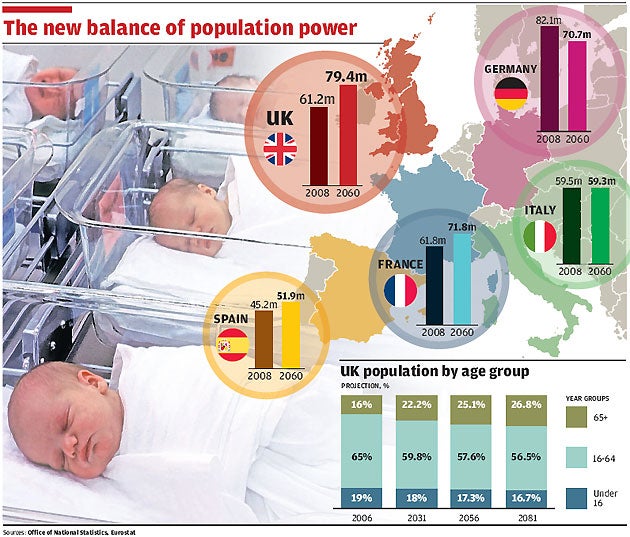Zimmer-frame nation: a vision of Britain in 2083
UK will have Europe's biggest population, predicts Office of National Statistics

Imagine Britain in 2083. A place where everyone seems old. So old, in fact that around 700,000 of our current twenty-somethings will survive to that distant time and receive their centenary birthday card from their close contemporary, King William V, who will be celebrating his 101st birthday that year. Perhaps the Royal Mail will still be around to deliver it. Our streets will be redesigned to ease "Zimmer-rage". Teenagers, prized by their employers, will wonder what is happening. Premier League footballers will earn more than ever. Children will be outnumbered by the over-75s. A grey place indeed.
So much science fiction? Not quite. The Office for National Statistics' latest projections, some tentatively stretching as far out as 2083, suggest that Britain's population will indeed become simultaneously older and bigger over the coming decades.
By then the UK will long have overtaken Germany and France as the most populous nation in Europe, with more votes than anyone else in a European Union it is still sceptical about. Britain's teeming masses may even be on the verge of overtaking Japan.
A UK with a population of almost 86 million may feel a little more crowded in parts, but governments of many parties will have copied the methods other nations have adopted to cope with dense populations – Japanese-style bullet trains that will give Sheffield the same commuting time as Guildford; taller, thinner houses and office blocks; gardens an expensive indulgence; and a concerted effort to move businesses and political functions out of London and the South-east.
On current immigration trends of around 180,000 net migrants per year and a fertility rate of about 1.8 children per British female, the population will rise by more than 4 million to 65.6 million by 2018, before rising to over 70 million by 2029, 80 million by the 2060s and 85.7 million by 2083. The number of centenarians is projected to rise from 11,000 in 2008 to 80,000 in 2033 before hitting an astonishing three quarters of a million in the 2080s.
Of the 4.3 million projected increase in the UK population over the next few years, around 2.4 million will come from the existing population (ie an excess of births over deaths), while 1.9 million will come from net migration. Of the possible 10 million increase by 2033, some 45 per cent will be from migration.
Migrants traditionally tend to be younger, and thus more likely to be part of the working population – an important consideration when the structural costs of an ageing population are likely to add to the already substantial addition to the national debt burden that will arise from the recession and bailing out the banks. Most economist say that the refusal of some European states to accept higher numbers of immigrants will leave their public finances even more vulnerable than the UK's. Immigrants and their children will add 7.7 million to the population between now and 2033, and help make sure the working population continues to increase (and pay for our pensions and NHS).
We can be reasonably sure that the UK's population will exceed France's by 2015, and will overtake Germany in around 2047, a consequence of larger immigration flows and a relatively high fertility rate among UK-born women.
Those EU nations, such as Germany, which have chosen to limit immigration from Poland and elsewhere, will suffer economically. The UK, though, will benefit from the changing balance of economic and political power. The UK ought to be the largest economy in the EU in a few decades (assuming we can get growth back on track), and will also dominate the Council of Ministers and the European Parliament, where power is proportionate to population.
British leadership of Europe will be there for the taking. Yet, when we come to celebrate the centenary of the EU in 2057, it is entirely possible that the Union's dominant power will still be discussing whether it was a good idea to join, and whether it might be time to have another referendum.
Join our commenting forum
Join thought-provoking conversations, follow other Independent readers and see their replies
Comments